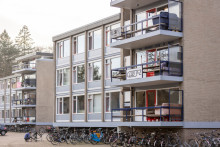The decision was made swiftly during last Wednesday’s University Council meeting: international first-year master’s students enrolling in one of the nine programmes covered by the new Beethoven framework will be offered accommodation by the University of Twente. However, they must accept the offer as it is — declining it means forfeiting the privilege. The arrangement also offers only temporary relief: after one year, students must vacate their housing to make room for the next cohort. In this way, UT aims to make Enschede a more attractive destination for international students pursuing a chip-related degree. This scheme is an expansion of the guaranteed housing offer already in place for visa-requiring (exchange) students.
The policy also affects, among others, new UT staff members and short-stay visitors, who will no longer be guaranteed university housing. The discontinuation of this (guaranteed) housing offer for staff is linked to the new Dutch legislation on ‘permanent rental contracts’, which has been in place since on 1 July 2024 already. Under this law, employees may no longer be given temporary rental agreements, meaning that a one-year guarantee is no longer legally permissible. The UT will continue to offer information and guidance to help with housing searches.
Housing will be allocated on a first come, first served basis. For now, the policy focuses on master’s students, but the UT intends to explore whether it should also be extended to bachelor’s programmes at a later stage.
Chip tech region
The rationale behind this preferential policy lies in Twente’s strategic focus on chip technology, through which the region aims to gain international prominence. In a previous interview with U-Today, Leontien Kalverda, UT's Beethoven coordinator, already elaborated on this ambition.
Beethoven master’s programmes
The nine Beethoven master’s programmes covered by the new housing policy are:
-
Applied Physics
-
Computer Science
-
Electrical Engineering
-
Embedded Systems
-
Industrial Design Engineering
-
Mechanical Engineering
-
Nanotechnology
-
Robotics
-
Sustainable Energy Technology






